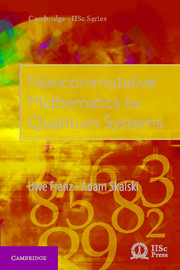Introduction
Published online by Cambridge University Press: 18 December 2015
Summary
Noncommutative mathematics might be considered as one of the major new trends of mathematics that arose in the twentieth century. Initially motivated by the formulation and development of quantum physics due to Heisenberg and von Neumann, the idea of ‘making a theory noncommutative’ has been since extended to many areas of pure and applied mathematics and turned out to be extremely fruitful.
In 1925, Heisenberg suggested replacing the observables of a quantum system, such as its position Q and momentum P, by noncommutative quantities, most commonly realised as operators on a Hilbert space. This idea allowed the correct prediction of the results of the experiments of quantum physics; for example, it led to a description of the observed spectra of atoms. It has also led to a cornucopia of new mathematics, in particular to the theory of von Neumann algebras and C *-algebras developed, respectively, by Murray and von Neumann, and by Gelfand and Naimark.
The general pattern of the noncommutative mathematics is the following: take a ‘classical’ mathematical theory, say topology, measure theory, differential geometry, or group theory, and reformulate it in terms of algebras. These algebras are algebras of functions on the spaces appearing in the ‘classical’ theory, that is, continuous functions (with values in ℂ) on a topological space, measurable functions on a measure space, smooth functions on a manifold, and so on. They inherit some additional structure, for example, an involution, a norm or topology, a coproduct, from the space on which they are defined. Finally, these algebras are always commutative. Axiomatizing the additional structure and dropping the commutativity condition one arrives at a noncommutative generalization of the original theory. In this way the theory of von Neumann algebras or C *-algebras can be viewed, respectively, as noncommutative measure theory and noncommutative topology. The theory of Hopf algebras can be viewed as noncommutative group theory (here a warning is in place: the term ‘noncommutative’ refers to the function algebra, not to the group multiplication, which can also be noncommutative in classical ‘commutative’ group theory).
The procedure of making a theory noncommutative is not canonical, the choice of the axioms of the new noncommutative theory is not unique and each time has to be adapted to the classical theory to which it is applied.
- Type
- Chapter
- Information
- Noncommutative Mathematics for Quantum Systems , pp. xv - xviiiPublisher: Cambridge University PressPrint publication year: 2016

